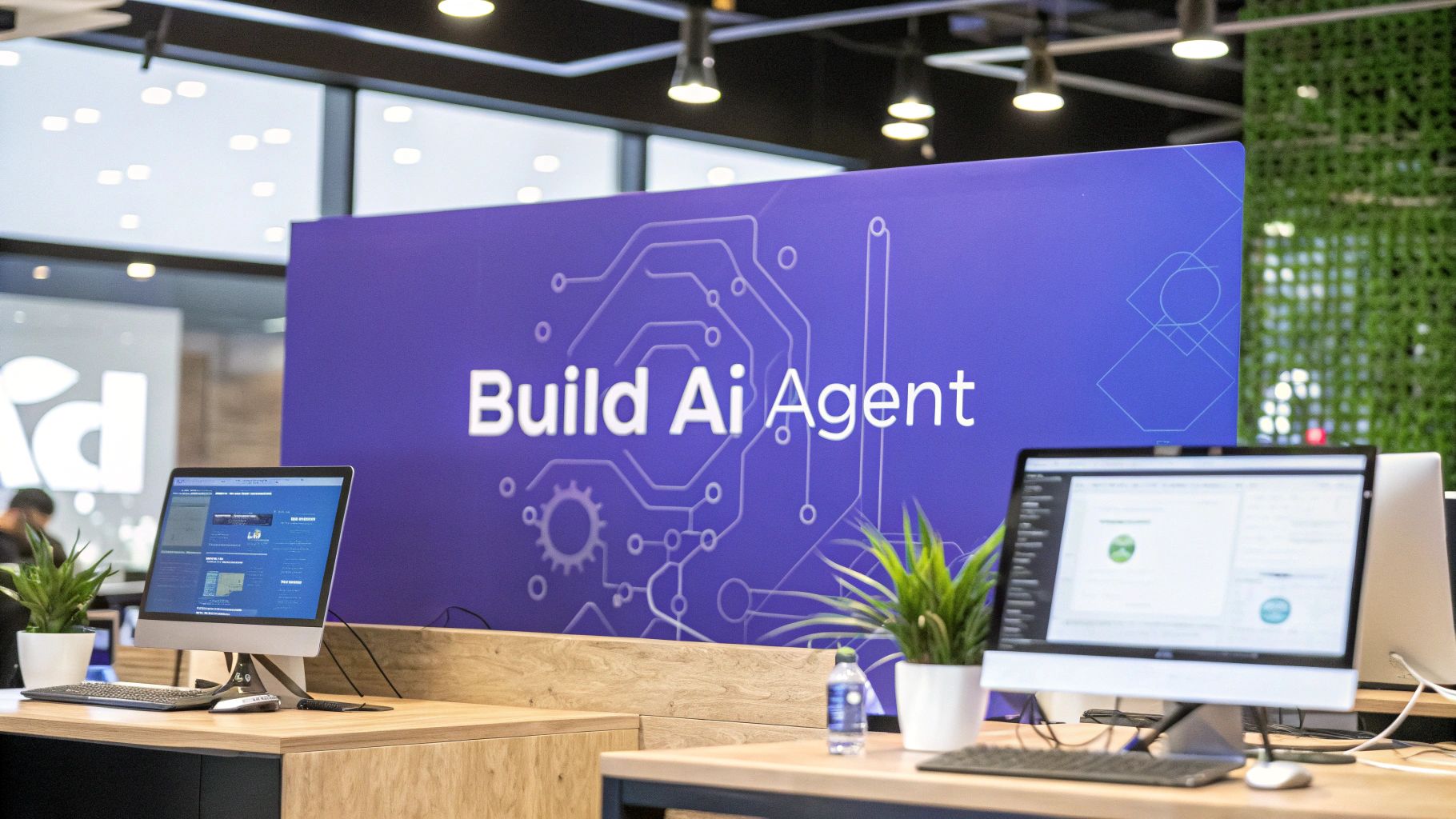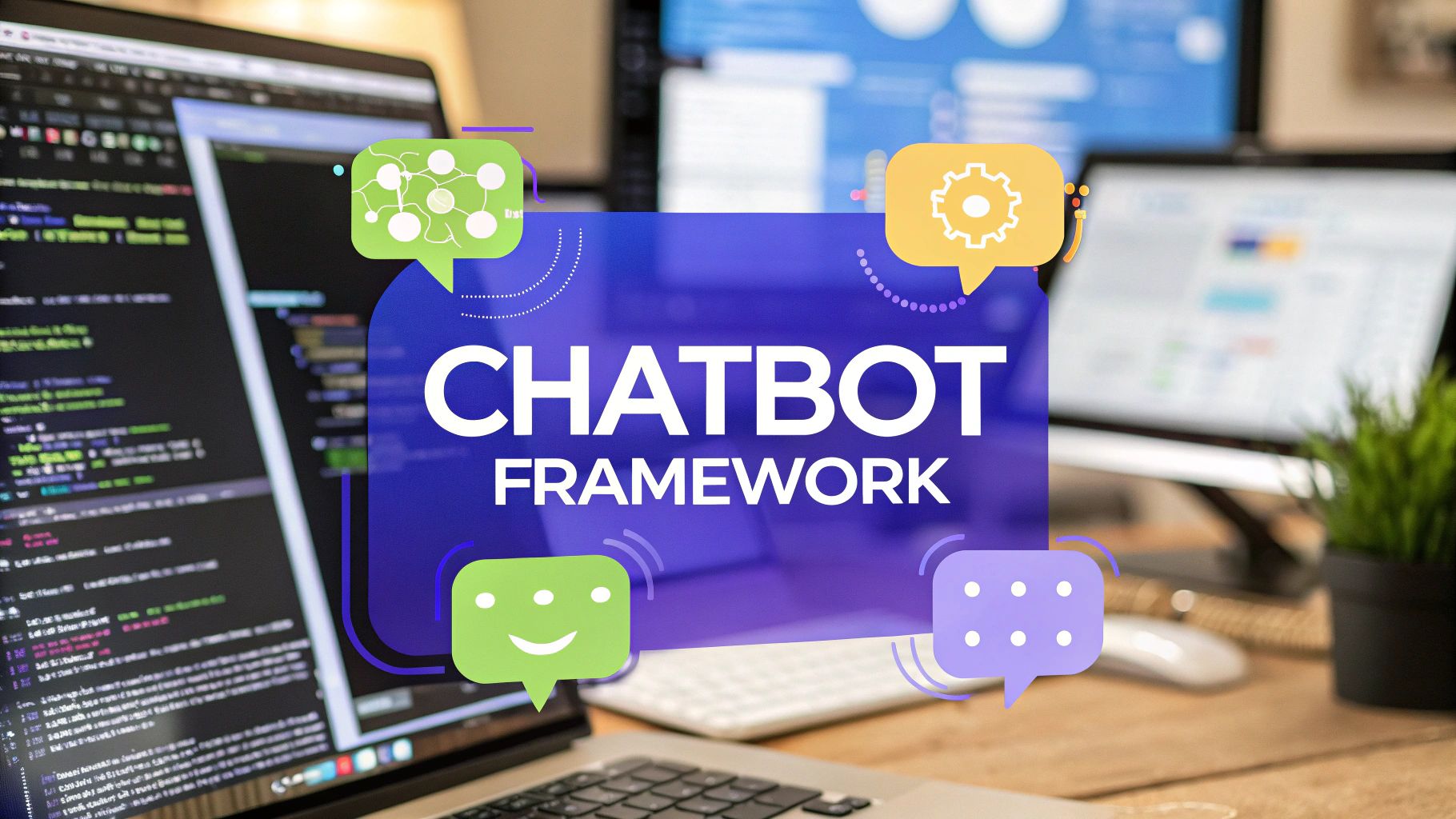A Guide to Intelligent Agents in AI
Explore what intelligent agents in AI are, how they function, and their real-world impact. This guide breaks down types, applications, and future trends.
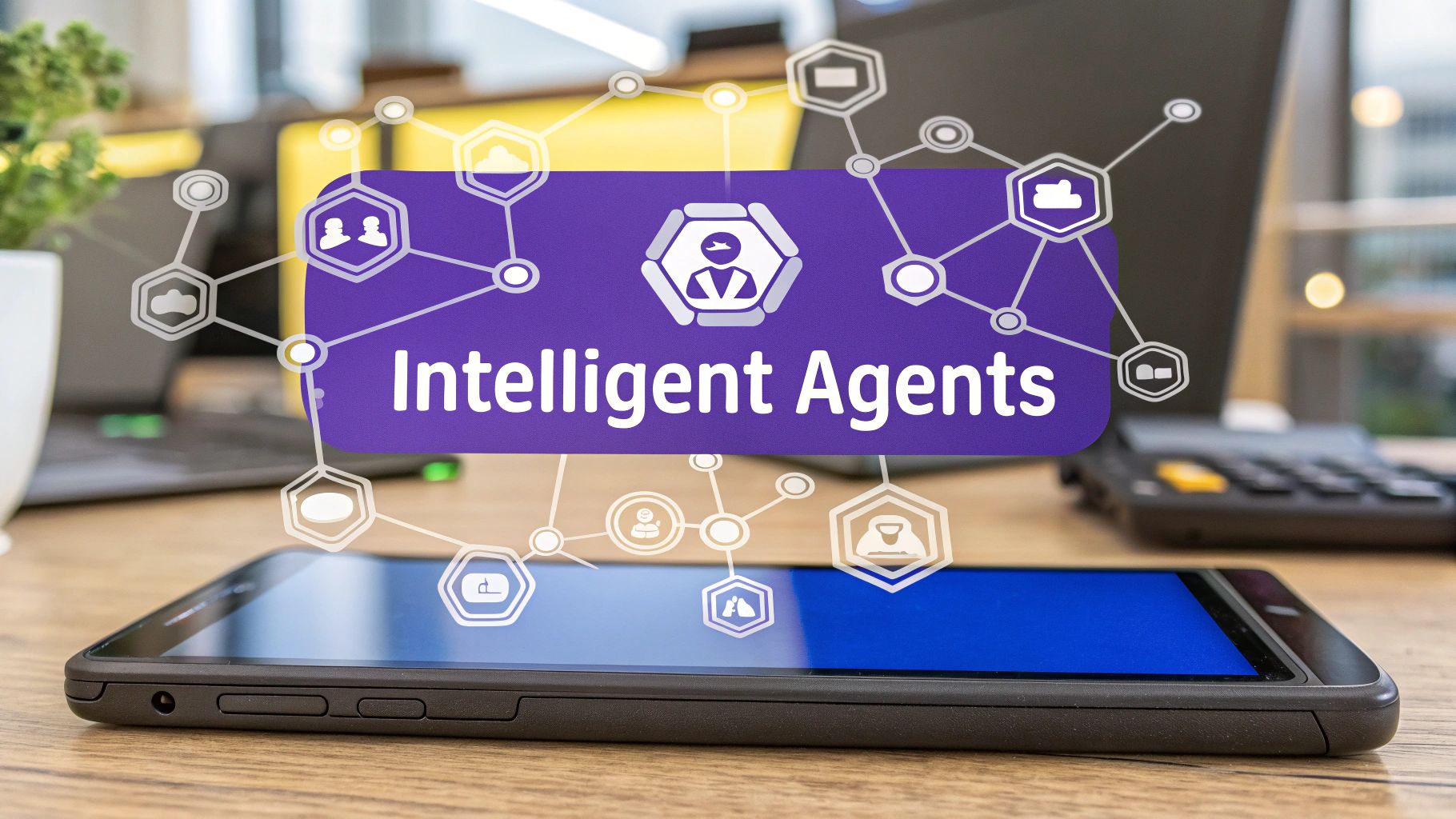
In AI, an intelligent agent is an autonomous entity that can observe its environment, make its own decisions, and take actions to hit a specific goal. Think of them as specialized digital employees, working independently to handle tasks from managing your calendar to optimizing an entire supply chain.
What Are Intelligent Agents in AI?
The easiest way to see an intelligent agent is to look at something you might already have at home: a smart thermostat. It uses sensors to perceive its environment, checking the room temperature, sensing if people are home, and even pulling the local weather forecast.
Based on that data, it decides what to do, like bumping the heat up by two degrees. Finally, it acts by using an actuator, the mechanism that physically turns on your heating system. This all happens automatically to achieve its goal: keeping your home comfortable and energy-efficient.
This simple loop of perceive, decide, and act is the foundation of every intelligent agent. They’re built to operate without constant human hand-holding, which is what makes them such powerful tools for automation. To see this concept in action, just look at modern AI personal assistant apps, which apply this same logic to manage digital tasks.
Core Components of an Intelligent Agent
To get how these agents work, it helps to break them down into their fundamental parts. Every agent, no matter how simple or complex, is built from these core components.
The table below outlines these building blocks, showing how each piece contributes to the agent's ability to operate on its own.
These components work together to create a system that can respond intelligently to its surroundings, much like a person would.
The market for this technology is exploding. Valued at around USD 7.38 billion in 2025, the AI agents sector is expected to hit nearly USD 47.01 billion by 2030. That's a compound annual growth rate of almost 44.8%, signaling just how important these agents are becoming across industries.
An intelligent agent is a system that can make rational decisions on its own. It observes its environment and selects an action it expects will maximize its performance, based on past observations and its built-in knowledge.
This ability to act autonomously is what truly separates them from simple programs that just follow a rigid set of instructions. Intelligent agents can adapt on the fly, making them perfect for handling dynamic and unpredictable tasks.
How AI Agents Make Decisions
To get a feel for how intelligent agents work, you have to peek under the hood at their internal logic. Their decisions are not just random guesses; they are the result of a structured process that lets them interact with the world in a deliberate way. One of the best ways to break this down is with the PEAS framework.
Think of this framework as a simple blueprint that splits an agent's job into four key parts: Performance, Environment, Actuators, and Sensors. Let's use a self-driving car to see how it all connects. The car's brain, often powered by sophisticated AI language models, takes in a constant stream of information from its surroundings to figure out the safest and smartest move.
The PEAS Framework in Action
The PEAS model gives us a clear way to map out and examine any intelligent agent. Applying it to a self-driving car makes the whole concept click.
- Performance: This is the report card for the agent. How well is it doing its job? For the car, key metrics are safety (don't crash), speed (get to the destination on time), and passenger comfort (no jerky movements).
- Environment: This is the world the agent lives and works in. For our car, it’s a chaotic mix of roads, traffic lights, other cars, pedestrians, and unpredictable weather.
- Actuators: These are the moving parts the agent uses to actually do things. The car's actuators are its steering wheel, accelerator, brakes, and turn signals.
- Sensors: These are the agent's eyes and ears. The car uses a combination of cameras, GPS, radar, and lidar to build a picture of the world around it.
This framework shows that an agent’s design is tied directly to its purpose. The agent's program is in a constant loop: take in data from sensors, measure it against performance goals, and use actuators to respond.
An intelligent agent’s rationality is defined by its ability to select an action that is expected to maximize its performance measure, given the evidence provided by its perception of the world and its built-in knowledge.
From Simple Rules to Complex Reasoning
Not all decisions are created equal, and the same goes for an agent's internal logic. The thinking behind intelligent agents in AI can range from simple if-then rules to incredibly advanced reasoning.
Take a simple reflex agent, like an automatic light switch. It only cares about what's happening right now. If it senses motion, it flips the light on. Simple.
But more sophisticated agents need to think more deeply. They have to weigh different outcomes, predict what might happen next, and learn from what they did in the past. These advanced decision-making processes often use complex techniques, including architectures like Actor-Critic algorithms, which cleverly blend different learning methods to find the best course of action. This lets them handle uncertainty and work toward long-term goals, making them far more capable than their simple, reactive cousins.
Exploring the Different Types of Intelligent Agents
Intelligent agents are not a one-size-fits-all technology. They come in several flavors, each with different levels of smarts and ways of making decisions. Think of it as a spectrum, ranging from agents that perform simple, automatic actions to those capable of complex, long-term planning.
Examining these different types is key to picking the right tool for the job. The field of intelligent agents in AI can be broken down into five main categories, with each one building on the capabilities of the last.
This hierarchy shows how agents evolve from basic reactive systems to sophisticated learning models.
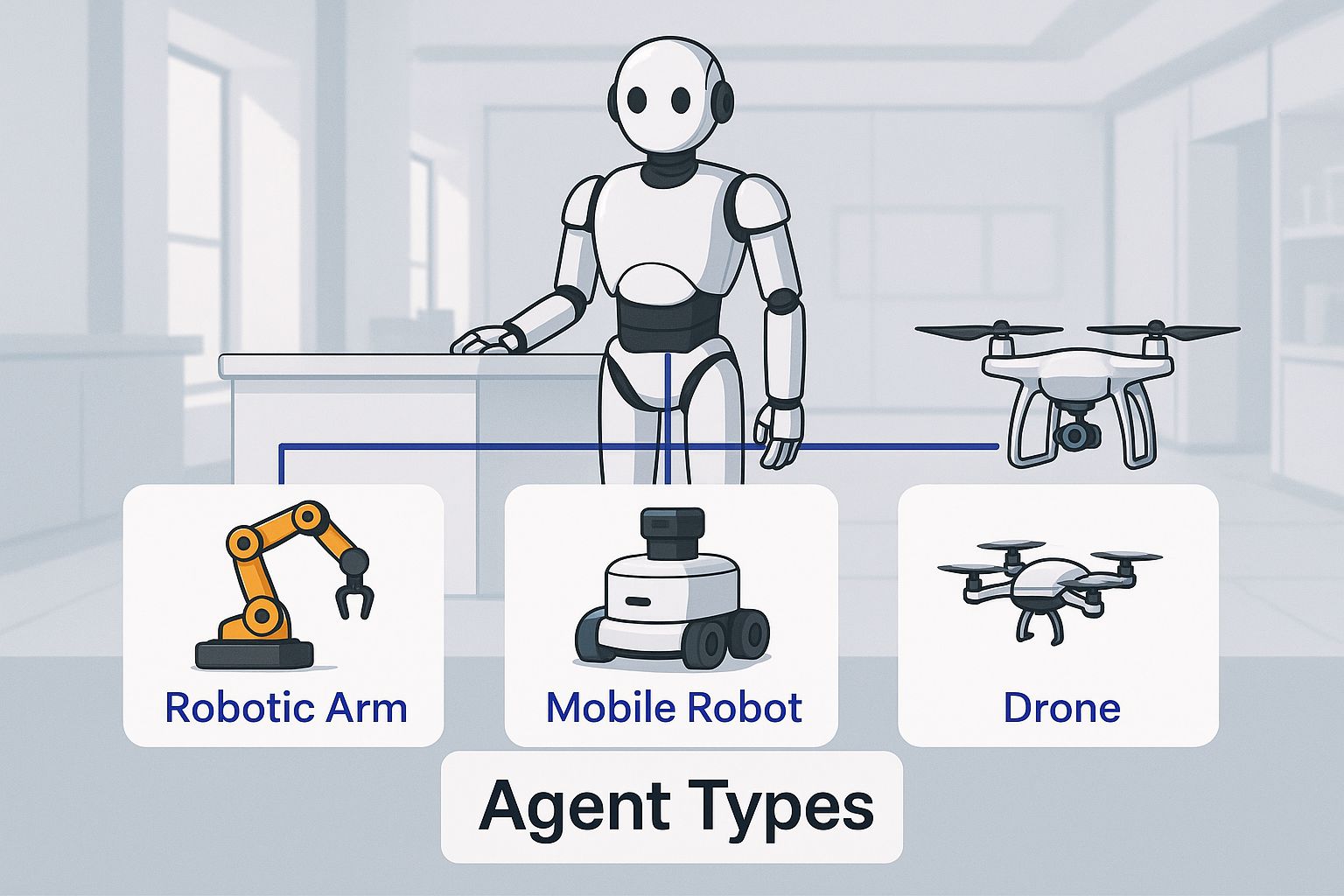
As you can see, there’s a clear progression in intelligence, with each new type incorporating more complex reasoning and a better picture of its environment.
From Simple Reflex to Goal-Oriented Action
At the most basic level, we have the Simple Reflex Agent. This agent operates on a pure "if this, then that" basis. It only reacts to what it sees at the current moment, with no memory of what happened before. A perfect example is an automated vacuum cleaner that bumps into a wall and immediately changes direction. It’s all about instinct, not thought.
A step up from that are Model-Based Agents. These are smarter because they maintain an internal "model" or map of how the world works. This lets them handle situations where they cannot see everything at once. A self-driving car, for instance, uses its internal map and knowledge of traffic rules to navigate, even when its sensors are temporarily blocked.
Then you have Goal-Based Agents. These agents are the planners. Instead of just reacting or following a model, they think ahead to the future consequences of their actions to achieve a specific objective. Your GPS navigation system is a classic example. It calculates multiple routes and picks the one that gets you to your destination, which is its one and only goal.
Utility-Based and Learning Agents
For situations with multiple possible outcomes, Utility-Based Agents are the way to go. They do not just work toward a goal; they aim for the best possible outcome. They do this by assigning a "utility" or "happiness" score to different states of the world. A stock-trading bot fits this mold perfectly, as it must weigh the potential profit against the risk of various trades to maximize its financial returns.
Finally, we arrive at the most advanced category: the Learning Agent. These agents get better over time through experience. They start with some initial knowledge and then improve by analyzing their own actions and the feedback they get. A personalized news feed that learns what you like to read is a great illustration of a learning agent in action.
Knowing how to build these more advanced systems is becoming a critical skill. You can learn more about the fundamentals in our guide on how to build AI agents.
The true power of an intelligent agent lies in its ability to adapt. Simple agents follow rules, but advanced agents learn, plan, and optimize, making them suitable for unpredictable, real-world problems.
This growing need for adaptable systems is driving massive market growth. The AI agents market was valued at about USD 5.43 billion in 2024 and is projected to skyrocket to USD 236.03 billion by 2034, according to a market analysis from Precedence Research.
Comparison of Intelligent Agent Types
To make these distinctions clearer, here’s a quick breakdown of the different agent types, their core characteristics, and where you might see them in the real world.
Each of these agents has its place, from simple automation to complex, adaptive problem-solving. The key is matching the agent's capability to the complexity of the task at hand.
Practical Applications of AI Agents
The real value of an AI agent is not just a concept on a whiteboard; it’s what happens when you put it to work. These are not just theories; they're practical tools already solving real problems and finding efficiencies in all sorts of industries.
From smoothing out customer support to untangling complex logistics, their impact is easy to see and it's only growing. Intelligent AI agents have gone from being simple automated scripts to sophisticated systems that drive huge gains in efficiency.
For example, companies like Cognosys and Adept are using AI agents to automate tedious work like reconciling invoices and triaging cybersecurity alerts. The result? They've cut down the human workload by over 60%. You can dig into more data on this trend in recent research on the AI agents market.
Revolutionizing Customer Service
Customer service is one of the most natural fits. Today’s AI-powered chatbots and virtual assistants are smart enough to handle support tickets that go way beyond just spitting out FAQ answers.
These agents can:
- Pull up customer history: They look at past purchases and conversations to give support that feels personal.
- Process returns or exchanges: An agent can walk a user through the entire process, no human needed.
- Know when to escalate: They can spot when a problem needs a human touch and smoothly transfer the chat to the right person.
This frees up human agents to focus on the tricky problems that require a bit more creative thinking, all while customers get faster answers. For a deeper look, check out our guide on real-world AI agent use cases.
By automating routine questions, businesses can make customers happier while cutting down on operational costs. The agent handles the volume, and the human team manages the exceptions.
Optimizing Logistics and Supply Chains
In logistics, timing is everything. Intelligent agents are changing how companies manage their supply chains by making real-time adjustments on the fly.
Imagine a logistics agent constantly monitoring traffic, weather, and how full each delivery truck is. Based on that live data, it can dynamically reroute drivers to avoid a sudden traffic jam, making sure packages get there on time.
This kind of minute-by-minute optimization was just about impossible to do at scale before. Now, companies see lower fuel costs, faster delivery times, and happier customers.
Assisting in Healthcare Diagnostics
The healthcare industry is also seeing some incredible benefits. Intelligent agents are being trained to analyze massive sets of medical data, including patient records, lab results, and medical scans.
They are not replacing doctors, but they are acting as powerful assistants. These agents can spot subtle patterns in data that a human eye might miss, helping clinicians make faster, more accurate diagnoses. This shows how intelligent agents in AI can support critical decisions, leading to better outcomes for patients.
Key Business Benefits of Using AI Agents
Putting intelligent agents to work in your business unlocks some serious advantages, moving you way beyond simple automation and into a world of real, tangible value. Think of them less as a theoretical concept and more as a practical toolkit that can completely redefine efficiency, sharpen your decision-making, and reshape the entire customer experience.
By letting them handle the complex, data-heavy tasks on their own, you free up your team to focus on what really matters: strategic growth and innovation.
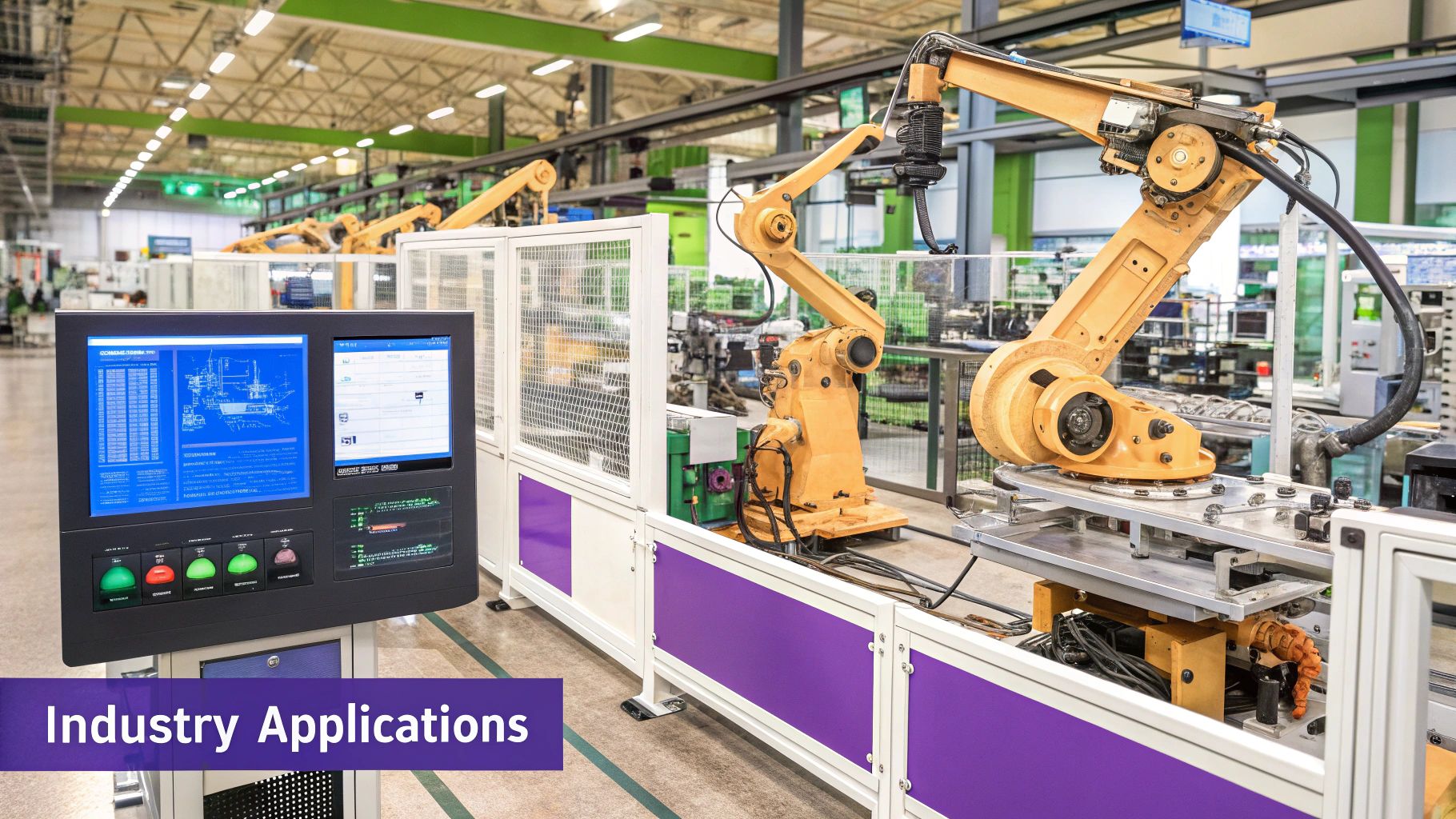
The first thing most businesses notice is a massive boost in operational efficiency. Intelligent agents are brilliant at automating the repetitive, time-sucking tasks that often bog down skilled employees, freeing them up for more creative, high-value work.
Take an e-commerce company, for instance. It could deploy an AI agent to manage its entire inventory. The agent would keep an eye on stock levels, analyze sales trends, and automatically place orders with suppliers when items run low. This completely wipes out manual data entry and prevents those costly stockouts or overstocked warehouse situations.
Sharper Decision-Making with Data
In today's fast-moving markets, making the right call quickly gives you a major competitive edge. Intelligent agents in AI deliver the data-driven insights you need to make decisions with confidence. They can process and analyze enormous datasets in moments, spotting patterns and connections a human team might easily miss.
Imagine a financial firm using an agent to monitor market fluctuations. The agent can analyze news, social media sentiment, and historical trading data to predict potential shifts. It then hands the analysts a concise summary with data-backed recommendations, letting them act fast on emerging opportunities.
By transforming raw data into actionable intelligence, AI agents help businesses make proactive, informed choices rather than reactive guesses. This leads to better strategic planning and risk management across the board.
Creating Personalized Customer Experiences
Finally, AI agents are a game-changer for delivering the kind of personalized experiences modern customers have come to expect. They can learn individual preferences and behaviors, which allows for customized interactions at a scale that just wasn't possible before. This builds much stronger customer relationships and boosts loyalty.
A streaming service, for example, can use a learning agent to analyze a user's viewing history. Based on that data, the agent curates a unique homepage with recommendations for movies and shows tailored specifically to them. This kind of hyper-personalization makes the service stickier and more engaging, reducing the odds of a customer hitting that "cancel subscription" button.
The Future of Intelligent Agents
The field of intelligent agents is moving fast, and we're quickly heading beyond the single-task assistants we use today. The next big shift? A more connected, collaborative future where teams of agents work together to solve problems far too complex for any one system to tackle alone. This is the core idea behind multi-agent systems, and it's a huge step forward.
Think about a massive logistics network. You could have one agent managing warehouse inventory, another optimizing delivery routes, and a third keeping an eye on weather patterns. Instead of working in silos, they’d communicate and coordinate in real time, making collective decisions to keep the supply chain humming, even when something unexpected happens. This kind of teamwork makes the whole system more resilient and adaptable.
The Rise of Autonomous Systems
Beyond just collaboration, the next frontier is true autonomy. The intelligent agents in AI of tomorrow will not just perform tasks; they'll manage entire business functions. Imagine an autonomous marketing agent that can dream up a campaign, set a budget, launch ads across different platforms, and tweak its own strategy based on the results, all without a human needing to step in.
This kind of shift could completely redefine what productivity looks like, letting businesses operate at a speed and scale that just wasn't possible before. But as agents get more independent, it also brings up some important questions.
As agents become more autonomous, it is paramount that they operate ethically and align with human values. The focus will shift from programming tasks to defining constraints, goals, and ethical guardrails for these powerful systems.
We have to think carefully about challenges like decision-making transparency, accountability, and control. Building trust in these systems will be just as important as building out their technical skills, making sure their integration into our world is both helpful and responsible.
Got Questions About AI Agents?
Once you start digging into intelligent agents, a few questions almost always pop up. Let's clear up some of the most common ones.
What's the Difference Between an AI Agent and a Chatbot?
It’s a great question, and it gets to the heart of what makes this technology so powerful. While they might look similar on the surface, an AI agent is a huge leap beyond a typical chatbot.
A chatbot is built for conversation. It answers questions based on a script or a knowledge base it's been given. Think of it as a reactive partner. It waits for you to ask something, then provides an answer.
An intelligent agent, on the other hand, is proactive. It does not just talk; it acts. It’s given a goal, and it can then make its own decisions, execute tasks, and connect with different systems to get the job done. It's the difference between asking for flight information and having an agent that can actually find the best flight, book it, and add it to your calendar.
Simply put, a chatbot is a conversational tool. An intelligent agent in AI is a task-oriented problem-solver.
How Do Intelligent Agents Learn?
This is where things get really interesting. The best agents are not static; they get smarter over time. The most advanced types, often called Learning Agents, use machine learning to adapt based on what they experience.
This usually happens through a feedback loop:
- Reinforcement Learning: This is a lot like training a pet. The agent tries an action and gets a reward (or a penalty) based on the outcome. Over time, it learns which actions lead to the best results and starts favoring those.
- Data Analysis: The agent constantly reviews the results of its past actions. By spotting patterns in what worked and what did not, it refines its strategies for the next time it faces a similar task.
This cycle of learning and improving means an agent becomes more effective and efficient on its own, without a developer having to manually update its code for every new scenario.
What Skills Are Needed to Build an Intelligent Agent?
Creating a solid intelligent agent takes a mix of computer science and data science know-how. You'll definitely need a good handle on programming languages like Python and a strong foundation in core AI and machine learning principles.
But the technical skills are only half the battle. Building an effective agent demands a crystal-clear idea of the problem you're trying to solve. You have to define the agent's environment, its goals, and how you'll measure success before you even think about writing code. This strategic thinking is what separates a cool tech demo from a tool that delivers real-world value.
Ready to build your own intelligent agents? Chatiant provides a powerful platform to create custom AI agents and chatbots trained on your own data. Automate workflows, improve customer support, and integrate seamlessly with tools like Google Chat and Slack. Start building with Chatiant today.
